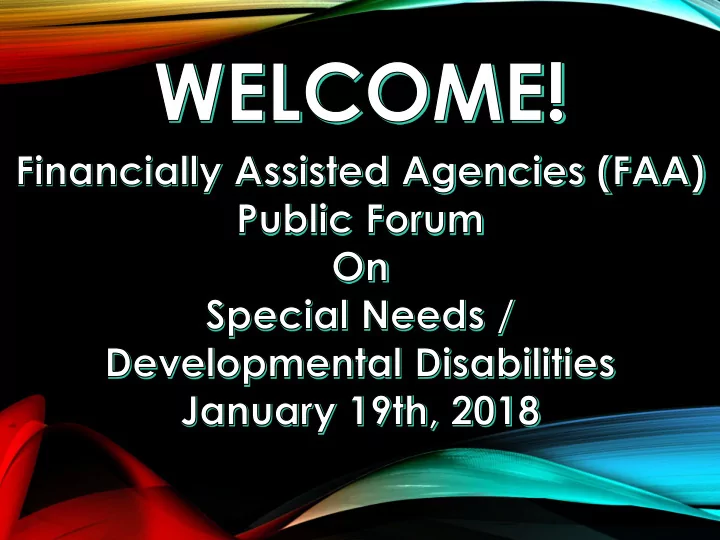

Convene Public RFP status update Convene Steering Forum to identify and summary Committee to plan service unmet Issue RFP documentation to Public Forum needs, gaps, CAC priorities Resources compiled for panelist including Proposals submitted Recruit and train RFP Convene Bidder’s performance history, and screened Panelist Conference internally at CSD logic model and budget reviews Process FAA Funding Review and Convene RFP Reconcile proposal Recommendation evaluate RFP Review Panel scores BCC agenda item Process
• The main objective of the public forum and community survey is to provide space for the community’s voice to be heard in terms of highlighting the existing service needs, gaps and funding priorities. • This data will serve as one of several resources used to inform the RFP process. • This effort better ensures the funding priorities are relevant and will work to meet service needs in the community.
Town Hall on Special Needs and Disability
Collective Impact • A framework to tackle deeply entrenched and complex social problems. It is an innovative and structured approach to making collaboration work across government, business, philanthropy, non-profit organizations and citizens to achieve significant and lasting social change. • 260 participants representing over 100 organizations
MISSION Provide a comprehensive, integrated system of care which supports and connects individuals with special needs and disabilities and their families to community- based services and opportunities.
VISION A community that comes together to enhance the lives of individuals with special needs and disabilities and provide opportunities for meaningful engagement throughout Palm Beach County
SNAC Objectives • Create new connections • Strengthen leadership and alliances • Share resources • Maximize effective use of community resources • Identify strategies for improving quality of life • Engage in collaborative action planning to solve problems
It all started with… • Community Needs Assessment • Provide a comprehensive analysis of the current service delivery systems for individuals with disabilities in Palm Beach County • Develop a business plan that includes costs of identified additional services and strategies to create a seamless system of care
Contributing Sponsors
CAN Methods Interviews Focus Groups Community Conversations Surveys
Findings • 12% of residents in Palm Beach County have one or more disability (over 167,725 residents) • $124,177,370 in funding for disability services/supports (equal to $740 per capita) • Issues impact: Across the Lifespan Across Disability Groupings
Identified Unmet Needs/Barriers Information & Assessment & Service Referral Early Diagnosis Shortages Transition Funding Streams Employment Practices Transportation Advocacy & Availability Futures Planning
Findings: Information & Referral • No Single Agency • I & R is Driven By Age • Who’s Who Becomes a Parlor Game • Some Information is Specialized & Unreliable • Pre-adulthood Panic • Word of Mouth Referral
Findings: Assessment & Early Diagnosis • Streamlined Child Find is Working • Early Diagnosis is Weak for Certain Disability Groups • Comprehensive Assessments for Low Incidence Disabilities • Post-school Evaluations are Scarce & Expensive
Findings: Service Shortages • Great Many Unmet Needs • Individual Islands of Excellence * • Broad Gaps in Housing, Respite and Job Coaches • Geographic Gaps; Specialized Services Gaps • The Ever-Present Waiting List (over 20,000 people) • Paperwork • Inconsistent policies regarding pay for services
Findings: Funding Streams • Funding is Unstable & • Insurance is Inconsistent Unpredictable • Behavioral & Mental Health • PBC Self Assessment, 2010 Needs • Uneven Access Across Disabilities • Priorities Shift with Elections • Waiting Lists: 10+ Years Long • Funds Seeking Funds: Grants • Complexity of Funding Criteria Games Florida is 45 th among the 50 states in per capita spending in support of persons with developmental disabilities.
Findings: Transition Practices • Early Intervention Transition is a Strength in PBC * • Transition to Kindergarten & Elementary: Not as Smooth * • Middle & Secondary Losing Ground for Post-school Transition • Loss of Opportunities for Post-school Preparation * • College Supports for Degree Oriented Individuals • Few Options for Others
Findings: Employment • More Islands of Excellence • Job Coaches Well Received • Dire Need for Competitive and Supported Employment Options • Limited Work Options (custodial, food service) • No Central Effort to Support Job Coach Development or employer support* 31% unemployed 47% work less than 10 hours per week
Findings: Transportation Availability • Erratic Patterns of Transportation Use • Public • Palm Tran Connections • Ride Sharing • High Need; High Use • Single Trip Relies on Multiple Uses
FINDINGS: Advocacy & Futures Planning • Lowest Ratio of Needs to Needs Met (29%) • Guardianship (Need a Variety of Supports) • Financial Planning (Immediate and Long Term) • Availability of Financial Planners & “Special Needs” Legal Services • Few Advocates for Mental & Behavioral Health Challenges • Minimal Supports for Elder Disability • Need for Support for Non-English Speakers • Self Advocacy Role in a System of Care
Priority Taskforces • Respite • Transitions and Education • Housing • Employment • Advocacy & Future Planning • Family Navigating • Virtual Hub
Priority SNAC Outcomes • Maximize access to information and referral • Expand availability of quality respite providers • Increase housing options • Improve transition practices • Increase employment opportunities for individuals with special needs and disabilities
Sharon Alexander, M.H.Sc., ITDS Executive Director/Director of Programs sharon@eunicorn.org 561-620-9377
Recommend
More recommend